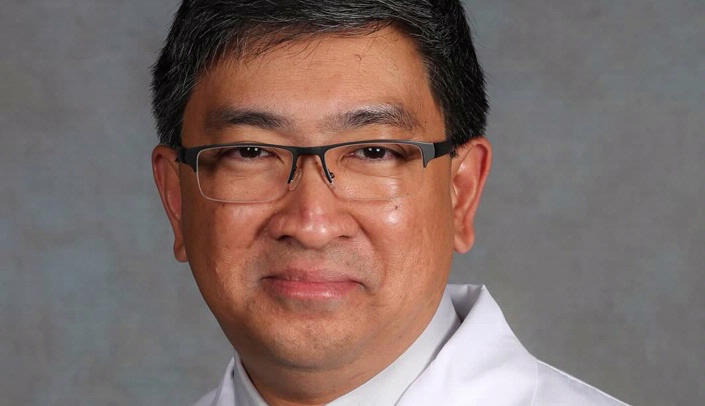When Alvin Wee received his Ph.D. in December, it was the first for UNMC’s Graduate Studies’ MSIA – Clinical Translational Research program.
Dr. Wee, who is a dental specialist in maxillofacial prosthodontics with two master’s degrees, was the first to earn a Doctor of Philosophy from the Clinical Translational Research program. The degree is now a permanent program in Graduate Studies.
The program has had several other graduates who have received a Master’s Degree in Clinical Translational Research, but not a Ph.D.
Dr. Wee came to UNMC in 2007, as an associate professor at the department of otolaryngology/head and neck surgery, after nine years as dental faculty at The Ohio State University. After investigating the Clinical Translational Research (CTR) program, Dr. Wee learned that involvement in the CTR fit the training component of his NIH K23 award. He decided to apply to the CTR program as a part-time graduate student, while serving as a full-time faculty member.
“My mentor in the CTR program, Lani Zimmerman, Ph.D., also agreed that working toward a Ph.D. was more appropriate than pursuing a third master’s degree,” Dr. Wee said.
This fall, Dr. Wee defended his dissertation, “Promoting Oral Cancer Examinations to Primary Care Providers and Medical Clinics in Nebraska.” One of three submitted manuscripts from his work has already been accepted for publication.
“The five-year survival rate of patients with oral and/or pharyngeal cancer has not improved much for the last 30 years. It has stayed around 50%. Part of the problem is that a group of the population does not see dentists, as they don’t have dental insurance. This same group may participate in high-risk behaviors for oral and/or pharyngeal cancer, such as smoking and/or drinking,” said Dr. Wee.
He added that this group of individuals usually has medical coverage and also has medical problems, so they typically visit their primary care providers at least once a year. Their primary care providers have an opportunity to perform a simple, non-invasive, one-minute visual and tactile examination during their clinical visits in order to screen for oral or pharyngeal cancer.
“The earlier the cancer is detected, the less treatment morbidity and higher chance of survival for these patients,” Dr. Wee said. “The use of a web-based educational intervention on oral and/or pharyngeal cancer has the potential to increase primary care providers’ short-term knowledge and to increase the frequency of primary care providers’ routine, nonsymptomatic opportunistic oral cancer examination on patients.”
The Ph.D. took seven years to complete, as Dr. Wee was working full-time in addition to his Ph.D. efforts.
“The MSIA faculty were very supportive, interdisciplinary and educational,” Dr. Wee said, “And my Ph.D. in clinical translational research has given me a good research foundation, expanding my depth of knowledge in this area of interest in order to obtain further external funding.”
Dr. Wee is currently a staff dental specialist and section chief in maxillofacial prosthodontics at Veteran’s Affairs Nebraska Western Iowa Health Care system and also special Associate Professor in the Creighton University School of Dentistry’s Department of Prosthodontics.
